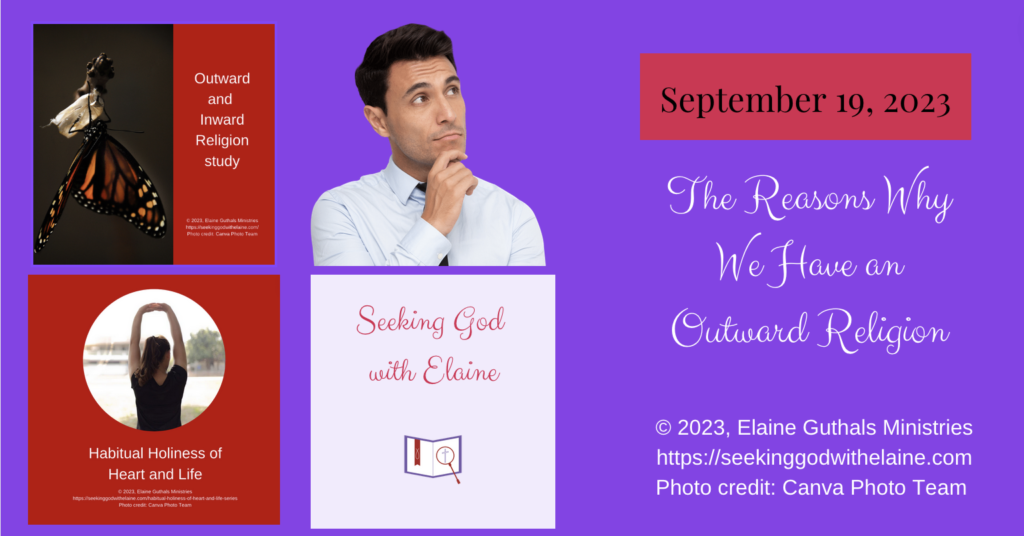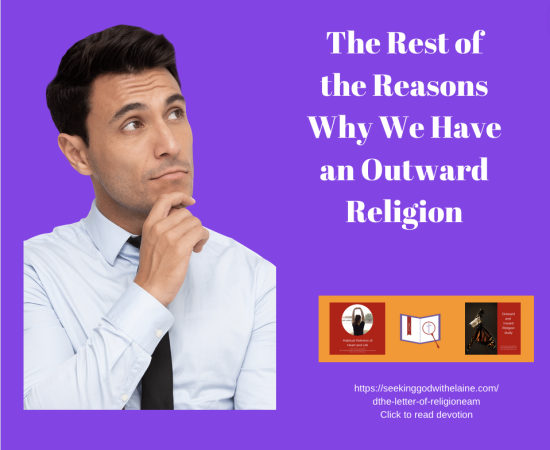In the last devotion, we began looking at reasons why we choose outward religion. This devotional reading concludes looking at these reasons.
Nuggets
- We have an outward religion when we cover our bases to ensure that we are worshiping all gods we know.
- We have an outward religion when we hold onto tradition rather than following God’s way.
- We have an outward religion when we rely on our own knowledge and understanding.
- We have an outward religion when we follow our consciences to be moral, good people instead of having God’s character.

In the last devotion, we started discussing Cumming’s sermon on the reasons why we have an outward religion. We only got through half of the reasons. This devotion will look at the remaining four.
Resource
Let's Put It into Context
To read devotions in the Habitual Holiness of Heart and Life theme, click the button below.
Here is a running list of nuggets for the theme.
Devotions in the Outward and Inward Religion study
Here is a running list of nuggets for the study.
Religion of Sentiment
“Now all the Athenians and the foreigners who lived there would spend their time in nothing except telling or hearing something new.” (Ac. 17: 21 ESV)
We have an outward religion when we cover our bases to ensure that we are worshiping all gods we know.
Cumming, I believe, took his own scenic route with this topic. He wrote, “This religion is nourished by all the beautiful and the romantic. It is the religion of Athens rather than the religion of Jerusalem —the religion of painters and of poets, rather than the religion of thinking and intellectual minds.
Resource
The point Cumming was making was that the Athenians worshipped beauty. They were surrounded by it.
Paul, on the other hand, said that the Athenians were always looking for something new. Don’t get me wrong. They were religious.
The problem is they wanted to cover all their bases. “For as I passed along and observed the objects of your worship, I found also an altar with this inscription: ‘To the unknown god.’ …” (Ac. 17: 23 ESV).
To me, that isn’t sentiment. Sentiment is where you hold onto something.
But if we say sentiment is an attitude, that is correct, isn’t it? Their attitude was they didn’t offer allegiance to any one god. They covered all the bases.
Way back in the Old Testament, God’s people dealt with paganism. The New Testament people were still worshiping idols.
That isn’t what God wants. He specifically told us what He wants: “You shall have no other gods before me” (Ex. 20: 3 ESV).
God doesn’t want a divided allegiance. He wants our total focus.
Parker told us why a divided allegiance does not work. He wrote, “You cannot stop at one idol. One brings another. This law has also its force in higher directions. You cannot stop with one isolated excellence. It is not excellence if you so use it. Vices go in groups; piety is a whole excellence and not a partial virtue.”
Resource
God doesn’t call us to keep what we have and add Him into our lives. We are called to place Him on the throne of our hearts.
Religion of Mere Form
“(For the Pharisees and all the Jews do not eat unless they wash their hands properly, holding to the tradition of the elders, and when they come from the marketplace, they do not eat unless they wash. And there are many other traditions that they observe, such as the washing of cups and pots and copper vessels and dining couches.)” (Mk. 7: 3-4 ESV)
We have an outward religion when we hold onto tradition rather than following God’s way.
The Jews in Jesus day did a lot of things a certain way because that was always the way they had done them. Someone had interpreted something one way, and they weren’t about to change anything.
But Jesus had come to change things. He wasn’t doing away with things. He was correcting the focus and practice.
We just talked about how God didn’t want us to follow the ceremonial law anymore. He wanted us to experience spiritual worship.
- Spiritual worship doesn’t follow the requirements of ceremonial law.
- God doesn’t want us to rely on ourselves any more than He wanted us to rely on the ceremonial law for salvation.
- Our problem is that we hold onto the past. A lot of times, we think it is better. Sometimes, we hold on because it is just more comfortable. There are eternal consequences if we hold onto the ceremonial law.
- God isn’t interested in a checklist, much less our success rate in completing it.
- The problem with the Jews and the ceremonial law was they only saw things one way – their way.
To read a devotion in the Finding Jesus through Spiritual Worship study, click on the button below.
If we are not worshiping God correctly or not following His laws and commandments, God wants us to change.
That is what sanctification is all about — changing to be more like God. Sanctification is the transformational process of the mind, body, and soul, which begins with regeneration; gradually changes our nature and morals through the promptings of the Holy Spirit; and ends with perfected state of spiritual wholeness or completeness.
- Regeneration is being changed from spiritually dead to spiritually alive and the internal new birth and requickening that God brings about through the work of the Holy Spirit to give us new character.
- Spiritual death is the separation from God that occurred as a consequence of Adam and Eve’s original sin.
- The spiritually alive are those who have ABCDed, so they are no longer separated from God.
- Spiritual death is the separation from God that occurred as a consequence of Adam and Eve’s original sin.
- Perfection means we reach a state of maturity because the combination of the spiritual graces form, when all are present, spiritual wholeness or completeness — holy, sanctified, and righteous.
- Spiritual graces are worldly morals that have been submitted to God to further His kingdom instead of enhancing this world.
- Sanctified means to be set free from sin.
- Righteous means we are free from sin because we are following God’s moral laws.
Glossary
The ABCDs of Salvation
If you have not become a believer in Christ, please read through the
Plan of Salvation and prayerfully consider what God is asking you to do.
A – admit our sins
B – believe His Son Jesus is our Redeemer
C – confess God as Sovereign Lord
D – demonstrate that commitment by making any changes needed in our lives to live the way in which God has called us
The Disciple’s Job Description
What was Cumming warning us against? He wrote, “It regards the outer aspect of things; not the inner light. This is not a religion that will stand.”
Resource
When we get right down to it, tradition is just another way to follow the world. We don’t want that, because it leads us away from God.
Religion of Intellect
“Thus says the LORD: ‘Let not the wise man boast in his wisdom, let not the mighty man boast in his might, let not the rich man boast in his riches’” (Jer. 9: 23 ESV)
We have an outward religion when we rely on our own knowledge and understanding.
Go back to our discussion of Paul in Athens. Who do we associate with the Greeks? Pericles, Socrates, Aristotle, AEschylus and Sophocles.
These are great thinkers and leaders with whom we associate the intellect. Some may, as Cummings said, profess Christianity because of fear.
Paul at Athens by the Sermons by the Monday Club noted the Athenians were considered religious. But Barnes and Bevis noted that they were more apt to be scientists, jurists, editors, orators, philosophers, etc., not theologians. In other words, their intellectuals weren’t looking for a god in their quest for answers — and definitely weren’t looking for God.
Resource
Unfortunately, that hasn’t really changed in today’s society. They aren’t looking for religion and most definitely not for a relationship with God.
And here came Paul, who was — granted — an intellectual himself, especially in his Pharisaical day. But Paul had been changed.
Paul stopped following the Pharisees’ line of thinking and started following God.
Isn’t that what we have been talking about all throughout this study? We have to give up following the world and follow God.
Religion of Conscience
“They show that the work of the law is written on their hearts, while their conscience also bears witness, and their conflicting thoughts accuse or even excuse them” (Rom. 2: 15 ESV)
We have an outward religion when we follow our consciences to be moral, good people instead of having God’s character.
S0me believe that the Holy Spirit is our conscience. Not so.
Cumming show us why that belief is wrong. He wrote, “It is possible for conscience to be in religion, and yet your heart not to be the subject of living and experimental Christianity. You will go to the house of God because your conscience would torment you if you did not do so. But is this the beautiful, the blessed, the happy religion of Jesus?
Resource
Our conscience can be called an inward witness. However, if we turn away from God, this conscience remains in us.
We all have consciences and moral character. Having a conscience does not make us moral. We are moral because mankind was made in God’s image.
We have to choose to exhibit that moral character or not. Worldview people have their conscience through which to guide them. Disciples have the Holy Spirit to show us God’s way.
The outward religion comes when we worship having that moral character – being a good person — as the end goal.
Instead, we should have moral character – God’s character – in order to glorify Him. Our conscience is just a tool to encourage us do right and not do wrong.
Walker reminds us that our consciences can grow and improve. If it is to be our religion, I would hope for something a little less of a moving target than that.
Resource
But isn’t that what the world wants? They want a religion that can stretch to handle everyone’s opinions. Then they want it to evolve when new ones are formulated.
God is unchanging. We cannot be our own gods if we are looking for a definitive religion.

Making the Connections
Each of the eight reasons we listed in this devotion and the last had a problem with them. We can’t have an outward religion as our only goal.
We have to have an inward religion. We have to get to the heart level.
How Do We Apply This?
- Improve our moral character to be that of God’s character.
- Have our actions reflect that character.
- Be sensitive to how others view religion, specifically outward religion.
- Examine the gospel to see how God wants us to walk with Him.
Resource
Father God. Lord, we want our relationship with You to be an inward religion at the heart level. Help us to resist having only an outward religion. Amen.
What do you think?
Leave me a comment below (about this or anything else) or head over to my Facebook group for some interactive discussion.
If you don’t understand something and would like further clarification, please contact me.
If you have not signed up for the email providing the link to the devotions and the newsletter, do so below.
If God has used this devotion to speak with you, consider sharing it on social media.